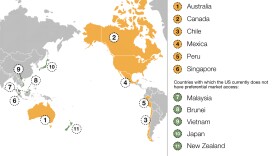By Brian Clardy
http://stream.publicbroadcasting.net/production/mp3/wkms/local-wkms-887650.mp3
Murray, KY – During the 2008 presidential campaign, then candidate Barack Obama promised a change in U.S. approach to foreign policy. Commentator and History Professor Dr. Brian Clardy believes the president has since been instrumental in creating positive transformative efforts, but says the overall status and tone of U.S. - Chinese relations will be the single most tenuous foreign policy dilemma the Obama Administration will face.
In the interest of full disclosure, I was and am currently a major supporter of President Obama and his policies. He has been instrumental in crafting a novel approach to foreign relations in a manner that has been transformative and innovative. Whether it's the pursuit of peace in the larger Middle East, or in crafting a new framework on climate change, he has delivered on the "change" that he promised in the 2008 campaign.
However, recent U.S. trends regarding the execution of its foreign policy towards China, I must admit, have left me with the proverbial "deer in the headlights" look as I perceive a gradual chill in relations between Washington and Beijing when disconnect of this magnitude comes at an inopportune time .
It is my firm belief that the overall status and tone of Sino-US relations will be perhaps the single most tenuous foreign policy dilemma that the Obama Administration will face.
The U.S. sale of arms to Taiwan, in my personal view, was a grave diplomatic miscalculation. It sent a bad message to Beijing that maybe the US will retreat to its pre 1972 stance, thus endangering the Sino-U.S. Relationship. The Obama Administration should seriously reconsider this venture for the larger good. Moreover, the President's recent meeting with the Dalai Lama could very well trigger a series of events that may be harmful to Washington-Beijing relations.
While this meeting signals a laudable effort to emphasize global human rights norms, there is a strategic element to this event that cannot and must not be overlooked. The U.S. must walk a serious geopolitical tightrope to draw attention to specific human rights issues within China, while not coming across as preachy or condescending towards Beijing. The fearful result could the "shutting down" of a diplomatic dialogue and seriously harming the Sino-U.S. relationship.
However , the Obama Administration is absolutely correct in noting serious concerns about the suppression of the Falun Gong, Tibetan independence, political prisoners, or religious persecution should not be completely obfuscated in the name geopolitical strategy.
Therefore it is imperative that President Obama should find a "happy medium" to address these concerns so that basic human rights concerns can be addressed, without damaging relations between Washington and Beijing.
It is clear that President Obama has a wonderful opportunity to engage the Chinese on a wide range of issues that both nations share. By taking a practical multi faceted approach to Sino-U.S. relations, President Obama's foreign policy will be greatly enhanced and the pursuit of larger geopolitical aims can be pursued that will be mutually beneficial to Washington, Beijing, and the larger world community.
Whether it is securing China's continued efforts in the North Korean Six-Party Talks, or curtailing Chinese military assistance to Sudan, the Obama Administration should seek to enlist Chinese assistance in curbing the spread of weapons abroad with the result that the potential for terrorist attacks and the reality of regional genocide will be eliminated altogether. Strategic emphasis on the other pillars can provide a strong basis for persuading China to enforce sanctions on Iran, thus forestalling a veto. Without Beijing's cooperation, the P5+1 negotiations with Tehran would be a dismal failure. In the U.S' approach to China, the Obama Administration should seriously take this into consideration.
It is a certain fact that the Chinese economy will continue to grow at a steady pace, and thus its trade relationship with the United States will set the tone for economic cooperation and prosperity. Thus in future talks, the Obama Administration should also seriously address serious environmental concerns, (beyond the fiasco of Copenhagen) as well the alleged Chinese infringement of intellectual property. And the two oft ignored question of the devaluation of Beijing's currency, and serious concerns over defective/health threatening imports can be the basis of cooperative talks assuming that the diplomatic environment has not been too terribly compromised over attempting to resolve other contentious issues.
I strongly suggest that by the middle of 2010 that the Obama Presidency convene a Sino-U.S. Summit be scheduled in Beijing to address these and other pressing issues. Moreover, regular and frequent consultation between the Secretary of State and the Chinese Foreign Minister become a constant and transparent part of the diplomatic dynamic so that both Washington and Beijing can cooperatively and jointly work on the nuances of that relationship.





